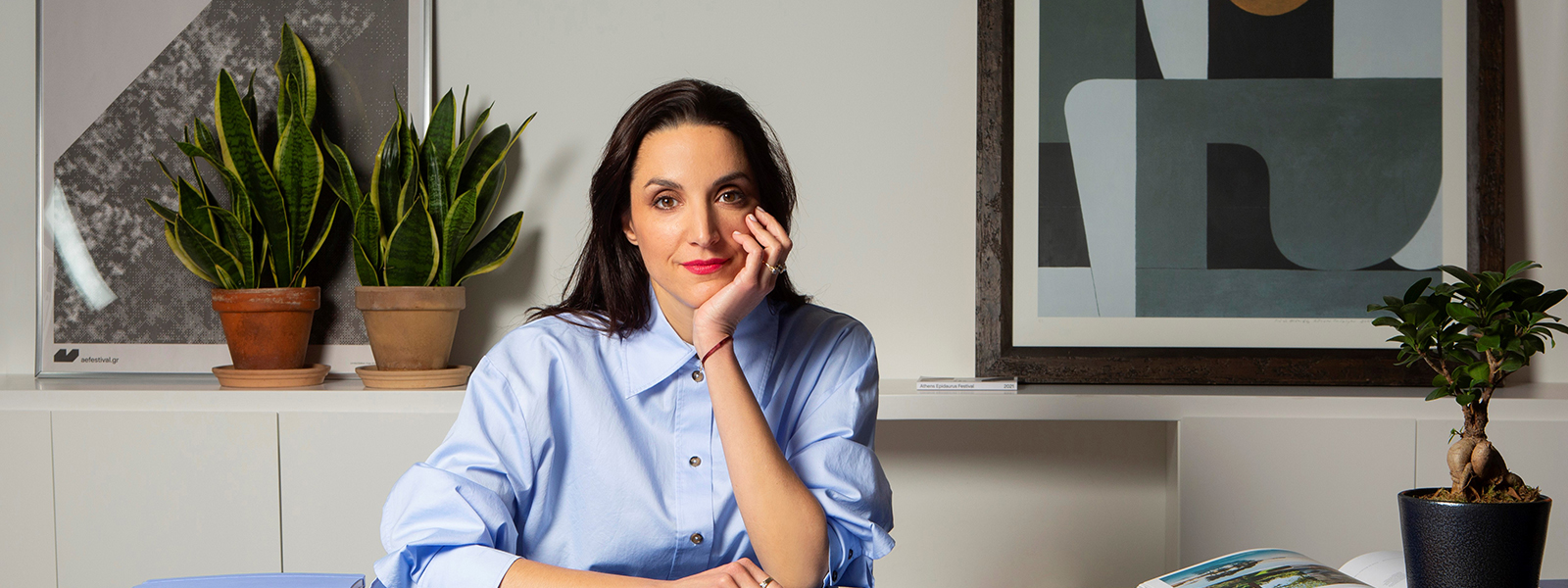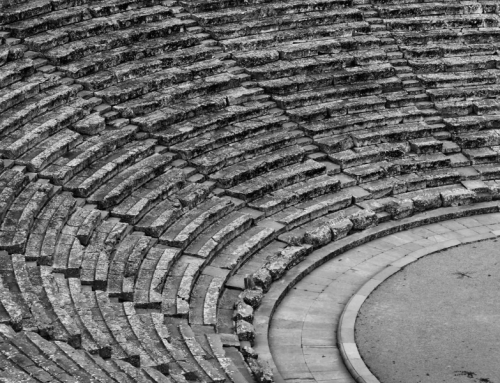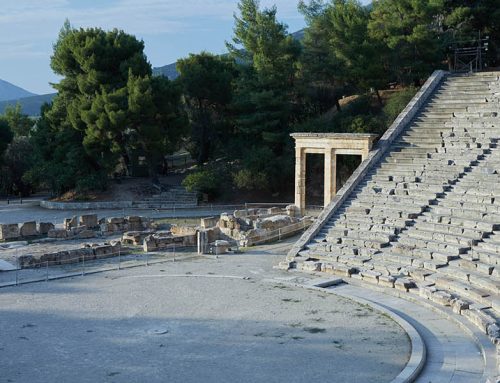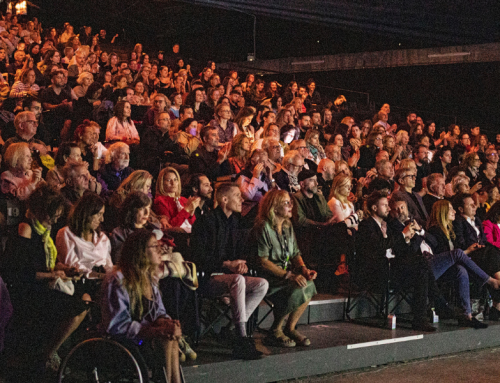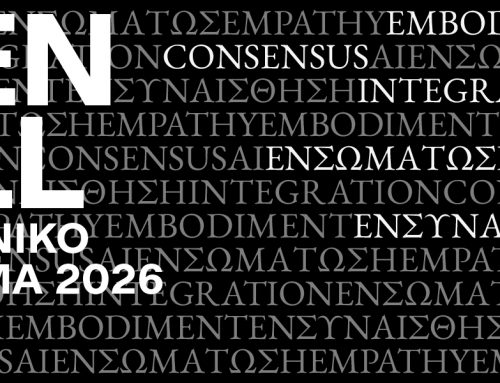The Athens Epidaurus Festival raises the curtain this year in a world ablaze. With 93 productions in 85 days and the contribution of approximately 2,500 performers and creators from around the globe; with a programme that is multivocal, feisty, consoling, political but also full of true beauty; with stars of international renown from the realms of Theatre and Music, along with new names at the cutting edge of contemporary avant-garde; with Dance productions, concerts, performances, screenings, discussions, educational programmes, publications, parties, free admission events, honorary tributes, new collaborations, a special showcase for art professionals and much more, we invite you to see the world in a new light, and to expand the time within you over the evenings you will be joining us.
How do we lead our lives? How do we bear our lives?
This year’s performances take on a political perspective, in the sense that they focus around the challenges of coexistence in contemporary societies: the demand for Democracy, Justice, and Inclusion, as well as the urgent need to engage in public life. This thread that runs through this year’s edition from Peiraios 260 to the Odeon of Herodes Atticus and all the way to the ancient theatres of Epidaurus.
In the Peiraios 260 programme, we selected performances that, through diverse artistic languages, respond to the two-fold question: ‘How do we lead our lives? How do we bear our lives?’ They touch on issues of identity, explore the impact of technology on our daily reality –in light of the emergence of artificial intelligence. They also speak of the sense of seclusion in a world that feels unwelcoming to its citizens but also of moments of joy brought about by togetherness.
‘Can art save the world? Or is the desire of artists to ‘speak’ through art and make an impact simply utopian?’ That is the question posed by Krzysztof Warlikowski in his new production that sets off from works by Nobel Prize-winning author J.M. Coetzee. ‘How can one separate the assertion of one’s own diversity from a broader political stance?’ asks Kornél Mundruczó in Parallax, while Caroline Guiela Nguyen in Lacrima weaves a tale of social oppression by following up the making of a royal garment. Conversing with the rich tradition of African culture, the choreographer Serge Aimé Coulibaly originally from Burkina Faso speaks, for his part, of the desire to rebel and tear down the old world. The Lebanese artist Rabih Mroué presents an eye-opening anatomy of government corruption, while Susanne Kennedy returns to the Festival and, together with the visual artist Markus Selg, presents a post-humanist futuristic commentary on the relationship between the human being and technology. In the same vein, Forced Entertainment and Tim Etchells celebrate 40 years of their unique presence on international stages with a new work that outlines the modern human being’s entrapment in an artificially intelligent environment.
The Dance programme highlights on themes of community and involvement, opening with À la Carte by international Greek choreographer Ioannis Mandafounis and the Dresden Frankfurt Dance Company. ‘Can we invent new dances that express us and new rituals that unite us?’ asks Tzeni Argyriou with her new choreography, while the Argentinian choreographer Ayelen Parolin, who is coming to Greece for the first time, wittily orchestrates the agonising struggle for human unity in an ever-changing world. The daily motion of a fearful society dominates Elias Hadjigeorgiou’s performance, Scared, while Kat Válastur’s Strong Born converses with the myth of Iphigenia in a dynamic ritual performance inspired by an ancient heroine that features prominently in this year’s programme. Anastasia Valsamaki’s dance performance The Verso resists the typical ‘on recto’ contact with the audience by creating moving landscapes, while Ermira Goro returns to Peiraios 260 with a solo inspired by the concept ‘telos’, namely the end, in a modular composition by four choreographers (Maria Hassabi, Hannes Langolf, Ioanna Paraskevopoulou, Ermira Goro).
‘We, the pending’*
Valeria Dimitriadou’s new work, Ninety, is centred around an ageing man who refuses to grow old and last year’s hit Songs of the Greek People – Drag oratorio by Giannis Skourletis and bijoux de kant returns.
The voices of people who are alone ‘unite’ in the Monologues Cycle comprising four productions. At Peiraios 260 we will meet Monsieur Linh and His Child, directed by the acclaimed Belgian director Guy Cassiers. Niketi Kontouri directs a play entitled Cryptogam by author Michalis Albatis in his first playwriting attempt, upon the Festival’s invitation. Finally, two more monologues will be presented at the Little Theatre of Ancient Epidaurus as part of the Contemporary Ancients Cycle.
Democracy / Justice / Archive
This Festival’s edition showed a keen interest in issues related to Archives and History. The Catalan Roger Bernat will present his own perspective on Pina Bausch’s legendary choreography, The Rite of Spring. In a tribute to Lefteris Voyatzis for the 80th anniversary of his birth, archival footage of the unforgettable Antigone he directed at Epidaurus (2006 & 2007) will be screened, while close collaborators of his will share moments from the production’s making.
With an emphasis on the archival component, we also dedicate a Cycle to Metapolitefsi (the period of Transition to Democracy after the fall of the junta in 1974): Xenia Kalpaktsoglou, Christoforos Marinos, and Christos Chryssopoulos revive the legendary TV show by Robert Manthoulis A Film, A Discussion (ERT, 1976-1982) through a scenic installation that brings the dialectics of Metapolitefsi to life through open discussions, performances, and screenings. On the occasion of the recent 50th anniversary of the Athens Polytechnic Uprising, Manos Karatzogiannis directs his performance 50 Years, One Night, attempting a contemporary reading of this defining moment from the lens of theatre. The Cycle culminates with a concert hosted by Dionysis Savvopoulos, upon the Festival’s initiative, who calls upon outstanding performers to join their voices in his own and other composers’ songs (Theodorakis, Hadjidakis, Markopoulos, and others) that are deeply rooted in the spirit of that era.
Democracy and Justice as timeless demands are key words to our programme: What We Owe Democracy is the title of our three-day platform of actions, in co-production with the Municipal Theatre of Piraeus, which focuses on the triptych Health – Language – Nutrition, and will be held at the Sotiria Hospital, the National Library of Greece, and the Keratsini Sea Food Market.
And yet the repertory at the Ancient Theatre of Epidaurus also sheds light upon these very concepts, through productions with the National Theatre of Greece: Aeschylus’ Oresteia, directed by Theodoros Terzopoulos, and Euripides’ Bacchae, directed by Thanos Papakonstantinou. Added to those are Aeschylus’ The Suppliants, staged by Marianna Calbari with the Greek Art Theatre Karolos Koun and the Neos Kosmos Theatre, and Aristophanes’ Birds and Plutus, the first directed by Aris Biniaris, and the latter by Giannis Kakleas for the National Theatre of Northern Greece.
Ancient Drama’s Global Appeal
We regard our performances by two leading European directors of exceptional importance. Timofey Kulyabin presents the world premiere of Euripides’ Iphigenia in Aulis with an outstanding cast of Greek actors and actresses through a modern political reading of the classic play –this production is part of our ongoing commitment to bringing Greek theatre into contact with prominent figures of contemporary drama. Tiago Rodrigues, the Portuguese stage director and new artistic director of the Avignon Festival, presents Not Hecuba where Hecuba’s tragic myth meets the story of an actress and mother in a performance that, as implied by its title, is not Euripides’ Hecuba –this production marks a fresh return for Comédie-Française at Epidaurus, and we are delighted to be hosting it immediately after its world premiere in Avignon. These are two completely different approaches to Ancient Drama, as Kulyabin follows Euripides’ original play, while Rodriguez authors a new one inspired by the ancient play.
In Athens, the leading theatre-maker Simon Stone, whom the Festival proudly presents for the first time in Greece as a director, moves in a similar dramaturgical direction staging the legendary production of Medea by the Internationaal Theatre Amsterdam at the Pallas Theatre. Stone, the ingenious auteur who has taken over the world’s greatest theatrical stages and operas and also has a remarkable cinematic oeuvre to show, authors a modern adaptation of the myth, in a production of highly aesthetic flair with stirring performances.
Contemporary Ancients and Music
The successful Contemporary Ancients Cycle returns for a fourth year at the Little Theatre of Ancient Epidaurus with two performances in a single night that engage in conversation with productions staged at the Ancient Theatre of Epidaurus: I, A Servant, based on Euripides’ Hecuba and written by Vangelis Hatziyannidis, directed by Nikos Hatzopoulos, and Iphigenia / Prey, based on Euripides’ Iphigenia in Aulis and written by Vivian Stergiou, directed by Ekaterini Papageorgiou.
At the Little Theatre of Ancient Epidaurus, we will also enjoy various music genres, such as classical lieder performed by our international soprano Alexia Voulgaridou, jazz arrangements of Hadjidakis and Tsitsanis’ works by the master of the genre Dimitris Kalantzis, as well as a special evening with Eleonora Zouganeli, who will perform beloved songs from the repertoires of folk and archontorebetiko genres.
Furthermore, Parodos, the successful interdisciplinary artistic research programme (studio residency), introduced in 2021, returns, coordinated this year by director Simos Kakalas, who will be working with young artists on Euripides’ Orestes.
GRAPE – Greek Agora of Performance
This new initiative for the systematic promotion and visibility of Greek Theatre and Dance abroad, which has already begun to bear fruit also returns this year. Eight works will be presented in a condensed five-day programme (21 – 25 July) addressed to professional international guests of the Festival, as well as to the Athenian audience. To us, the Festival’s mission is dual: on the one hand, to present foreign artists to the Greek audience and on the other hand, to create the conditions, generate the means, for the promotion of Greek artists on international stages.
All of grape’s works in some way pose the question: ‘Can we briefly reverse our view of the world?’ Whether touching on political and social issues or existential ones, through a more poetic perspective, by means of myth or folk tradition, these performances shed light, each in its own artistic language, on our relationship with the present.
This year’s grape artists are: Anestis Azas, Katerina Andreou, Mario Banushi, Zoe Chatziantoniou, Argyro Chioti, Efthimis Filippou-Angeliki Papoulia, Chara Kotsali, and Yolanda Markopoulou-Station Athens Group.
‘Magicians on the stage’*
At the Odeon of Herodes Atticus, we will be presenting a very powerful programme, with great orchestras, leading conductors and performers, as well as renowned figures of contemporary and Greek music, while, after many years, the art of Dance returns with a major artistic event, Anne Teresa de Keersmaeker and the Rosas’ new creation in a choreography that will engulf the stage with its explosive energy.
With respect to classical repertoire, we pursued to maintain balance between more recent driving forces in music, such as the idiosyncratic counter-tenor Jakub Józef Orliński and the chief conductor Santtu-Matias Rouvali, with established names, such as Emanuel Ax, Leonidas Kavakos, and Yo-Yo Ma, and great orchestral ensembles, such as the Athens State Orchestra with our leading principal conductor Lukas Karytinos and the renowned American, Estonian-born, conductor Neeme Järvi, the Chamber Orchestra of Europe with Simon Rattle, the Grazer Philharmoniker with Vassilis Christopoulos, the Philharmonic Brass with Philippe Auguin, and Philharmonia Orchestra. Our programme will be enriched by brilliant female performers, such as Katia Bouniatishvili, Patricia Kopatchinskaja, Magdalena Kožená, and Alexia Mouza. The Odeon of Herodes Atticus programme opens and closes with the two opera productions by the Greek National Opera.
Our Greek programme is headlined by three leading figures of Greek music: Dionysis Savvopoulos on a tribute concert to Metapolitefsi, Tania Tsanaklidou with a musical performance spanning her 50 years in album-making, and Mimis Plessas, who celebrates his 100th birthday this year and whom we honour with a concert dedicated to his legendary career.
As to contemporary music, we will have the opportunity to enjoy ANOHNI and the Johnsons, in the world premiere of their tour, Loreena McKennitt’s beloved melodies, the phenomenal Sting, and jazz legend Charles Lloyd alongside his quartet and his special guest Maria Farantouri.
‘Other galaxies’*
With a view to the 70th anniversary of the Festival in 2025, we are expanding our collaborations with historical institutions and various venues in the city, from the Sea Food Market at Keratsini to Pallas Theatre, from the Hellenic World Foundation’s open space to the historic Old Parliament House, from the EMST and the National Library of Greece to the Sotiria Hospital, the stage of Sychrono Theatro, and the Athens Conservatoire.
In co-production with the Athens Conservatoire, the Subset Festival returns refreshed. This versatile music platform focuses on the dialogue between contemporary music and new media, commissions contemporary Greek ensembles and artists, hosts workshops and screenings, and invites international guests to make up for another year a panorama of musical expression that holds a special place in the Athens Epidaurus Festival, attracting new audiences. From Raed Yassin to Alexandros Drymonitis, and from Laurel Halo to Ben Frost and the Kaleidoskop ensemble with Maya Dunietz, among other artists, as well as a special screening of Ryuichi Sakamoto: Opus directed by the Japanese-American filmmaker Neo Sora, this year’s Subset Festival is expected to take us to new dimensions.
Furthermore, a new collaboration with the National Museum of Contemporary Art flourishes through a cycle of roundtable discussions entitled Future Perfect: The time of perplexity. Also, well-known names of the Greek indie and alternative scene will be hosted at the Indie Playground Festival, held for the first time in 2023 in collaboration with the Hellenic Cosmos Cultural Centre and United We Fly, and taking place once again at the industrial space Playground 260. Throughout the Festival, discussions, parties, live performances at the Platea of Peiraios 260, as well as pre- and post-show talks will be enhancing the festival experience.
I wish to extend my heartfelt thanks to all the people of the Athens Epidaurus Festival, and especially the team of Artistic Advisors for their invaluable contribution to the programme. I warmly thank the Board of Directors, and especially the President Mr. Dimitris Passas, with whom we have been working harmoniously together for the past five years. I would also like to thank the Festival’s Director General, Dr. Ioannis Kaplanis. My special thanks to our sponsors, old and new, who support the vision for a bold programme.
The summer has been intertwined with the Festival for 69 years. We can’t wait to see you!
Katerina Evangelatos
Artistic Director
Athens Epidaurus Festival
* Lyrics by Dionysis Savvopoulos



